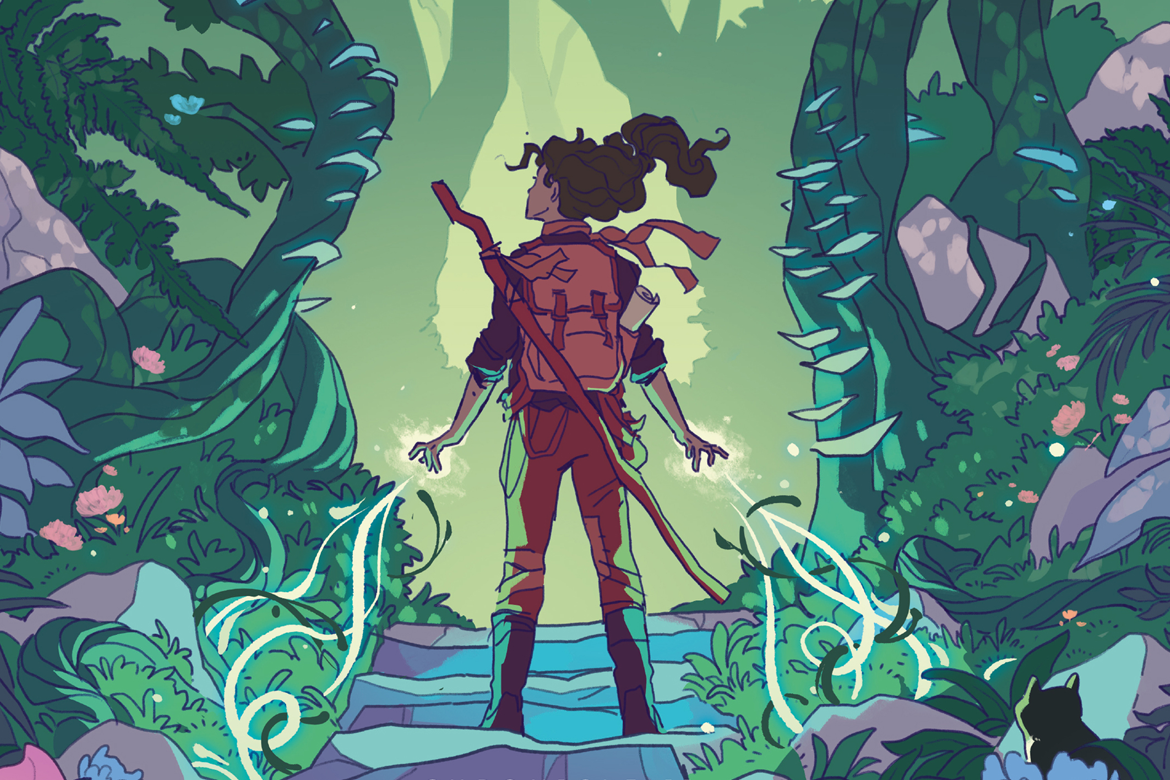“Ciphers of lost things, revealed by the moonlight.”
Londoners Mountain Caller return for their sophomore release, Chronicle II: Hypergenesis, with all the energy of their first album applied to a new canvas. This is truly a metaphor that works on many levels, as this band paint extraordinary pictures with their unique brand of music – what I can only describe as genre-defying. There are elements of so many different bands at play in this music, and so many different genres that becomes hard to pin a one on them. My best attempt with words alone is: a rock band playing metal.
In my notes, I described Mountain Caller’s sound as ‘Opeth X Mastodon X Coheed‘, but then Deafheaven came to mind, as did Sunny Day Real Estate. And this is what music should be, it should be un-pinnable. In a musical landscape littered with glorified cover bands who sound just like another band, Mountain Caller present a reminder that music isn’t about boxes, or doing it exactly like your influences: it’s about taking those influences and doing your own thing with the paints they used.
The production on this album is fantastic; the drums sound spot on and the bass sounds fat, even when it the tone is brighter. Of the many faces of tone the guitars wear throughout the album, not one is bad. Every reverb-soaked clean tone is beautiful; I drew comparison to the clean tone virtuoso Buckethead uses on tracks of his including “Soothsayer (Dedicated to Aunt Suzie)”. The chunkier doomy riffs are allowed to shine through in all their glory, thanks to a tone that was enough ‘Red Fang’ without being clipped-to-shit with fuzz. It is ‘creamy’ enough to still fall under the category of distortion rather than fuzz or overdrive.
Though I have sung Mountain Caller’s praises a lot on Chronicle II, the record also presents two tracks that are not as strong as the rest. “Into the Hazel Woods” does too a little too much for me, for example, around 2:30 is very Sunny Day Real Estate, but then is immediately followed by a riff that screams Hemispheres-era Rush in the way it turns quickly and rhythmically. The band that knows how to hold back with the show-off stuff forget how to; though this is not necessarily a negative, as fans who may hope to hear the band hold nothing back in the way of technicality certainly have their wishes granted. “Hypergenesis” has the problem of seeming like it is going to build to something, then starting to build to something else just as you’d expect it to drop into something heavier. This is a shame, as the song caught my attention around the sixth minute when it picks up the pace, eventually dropping into slow, heavy riffage that should have come much sooner. These sections of the track end the album with an example of one of the band’s strongest suits: the ability to use contrasting, often stark dynamics creatively, which listeners will find all over this album.
These weaker tracks are footnotes to a solid record overall. In particular, “Dead Language” and “March of the Göll” were favourites of mine, with “The Archivist” also deserving of a mention amongst highlights of the album. There are parts of “March of the Göll” that give me big Lost and Found-era Mudvayne, everything from the chord choices, drum patterns, the guitar tones. I also got a bit of Rugby death-doomers Conjurer from this one.
“Dead Language” is the band’s vocal debut with bassist El Reeve lending her great voice to the track, truly this track is only made all the better for the addition of vocals, and the musical content of the song is as interesting as usual, if not a slight cut above the rest. The song also features an ‘open this pit moment‘ around the middle of the song, before returning to the intimate sound of a beat tapped on the rim of a drum heard at the beginning of the track, this time accompanied by the vocalist reaching into the lower portions of her vocal range. Reeve then belts over a sudden great reveal, the music soaring back to life. This section is sonically reminiscent of Opeth’s “Blackwater Park”, before going on to explore some different ideas off the back of this section. How well the vocalist pulls of this belt demonstrates that she is extremely capable, and the band should not write off the possibility of implementing vocals into future tracks.
Overall, Chronicle II: Hypergenesis makes you feel like you are going on an adventure, perhaps landing the band best in the category of Adventure Metal, as coined by fellow instrumental tech-metallers Scale the Summit. The track “Sunken City” or “Howling Giant” came to mind in the heavier regions of the album. The band know how to use dynamics effectively to create interesting music to listen to, and know to catch the listener’s ear by cleverly interweaving sections where the bass drops out, demonstrating an understanding of music production and thought-out songwriting. A fantastic group of musicians, including a drummer who thinks twice about using the most obvious drum patterns to further create ear-catching, interesting music, such as on “Dead Language”, wherein the power of drums to shape a song’s tone is really well utilised throughout the song. I found a few tracks did not work for me, but the good far outweighs the bad. Walking the fine line between intellectual and jamming, Mountain Caller do not disappoint with their second album, with quality many bands don’t attain until perhaps their fifth.
7/10
Chronicle II: Hypergenesis drops through Church Road Records on the 26th January and can be pre-ordered here.

